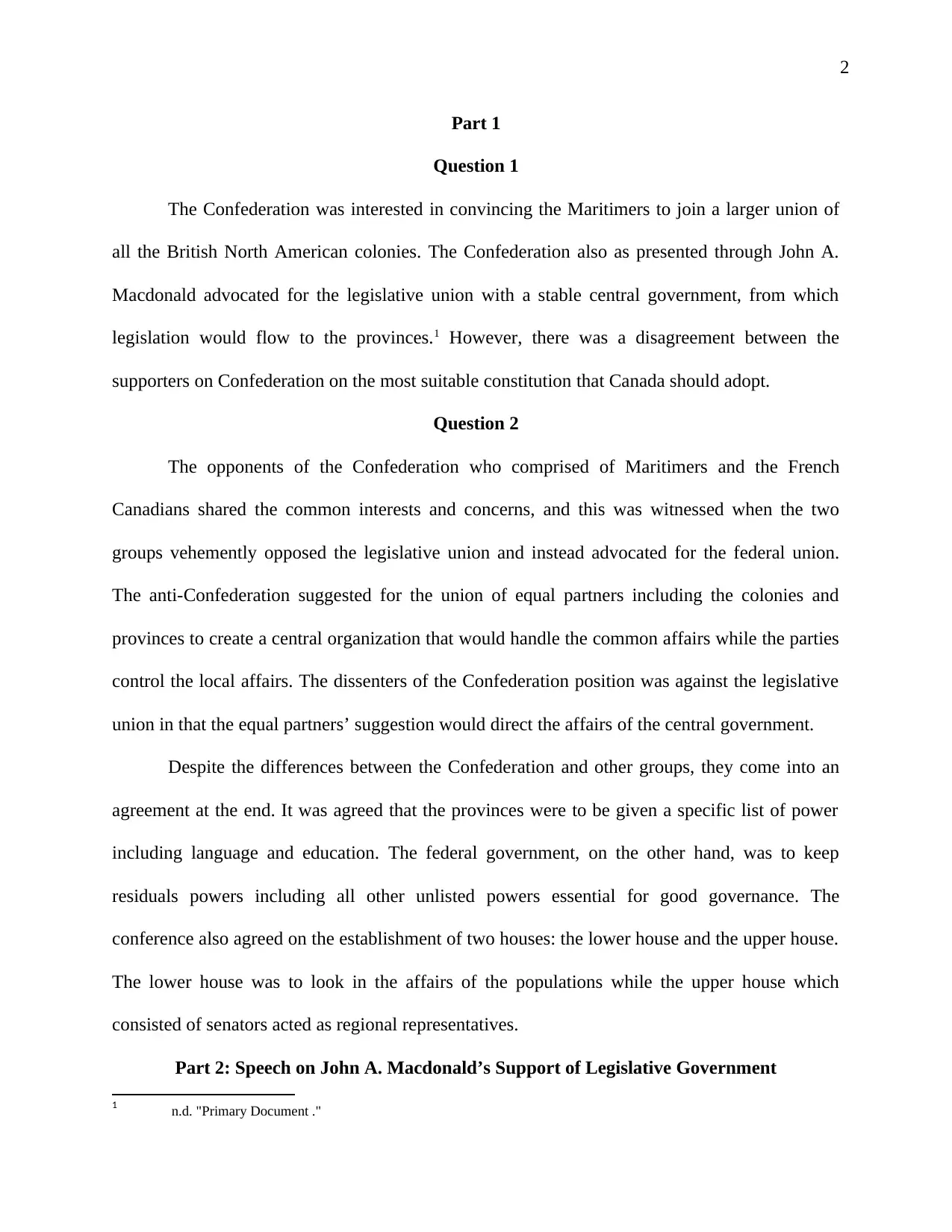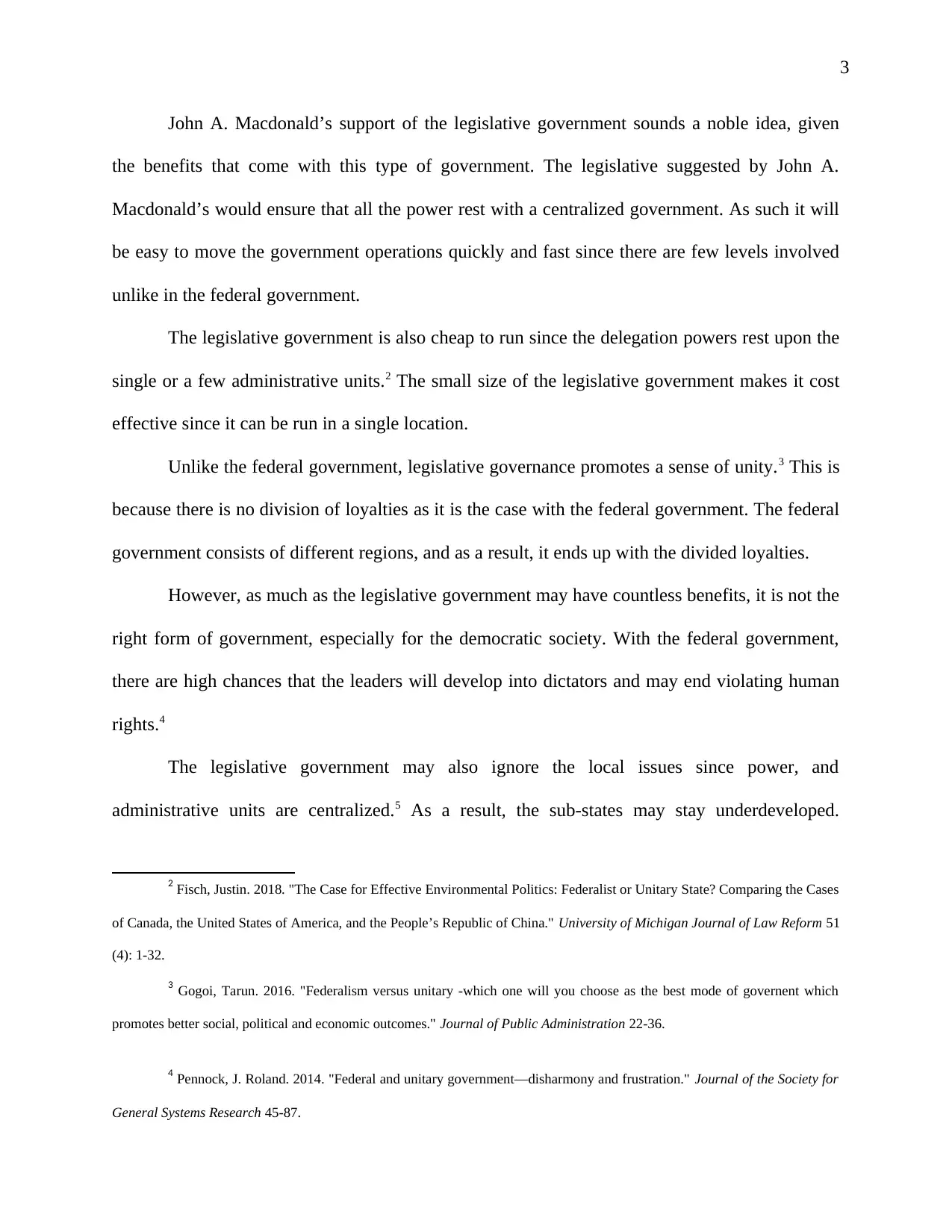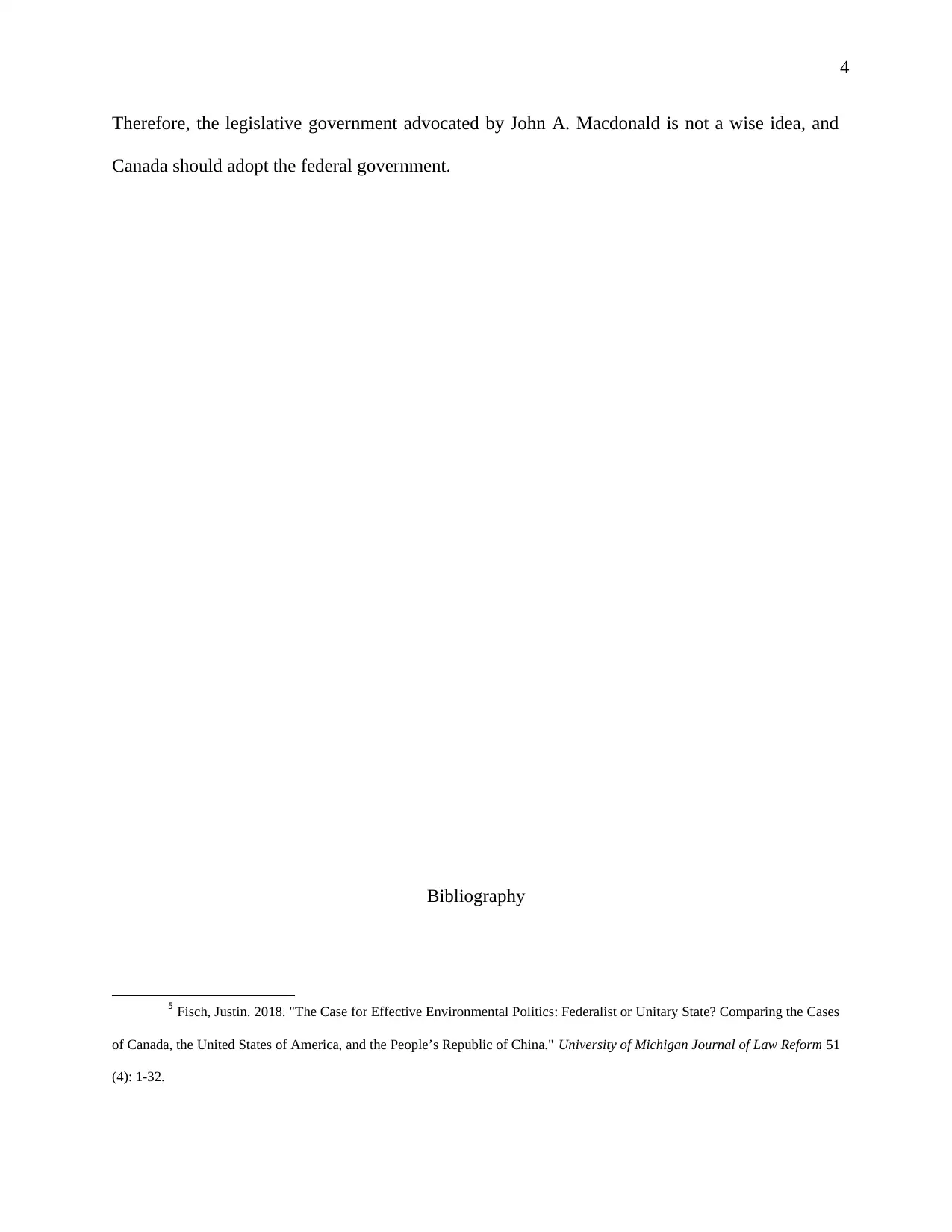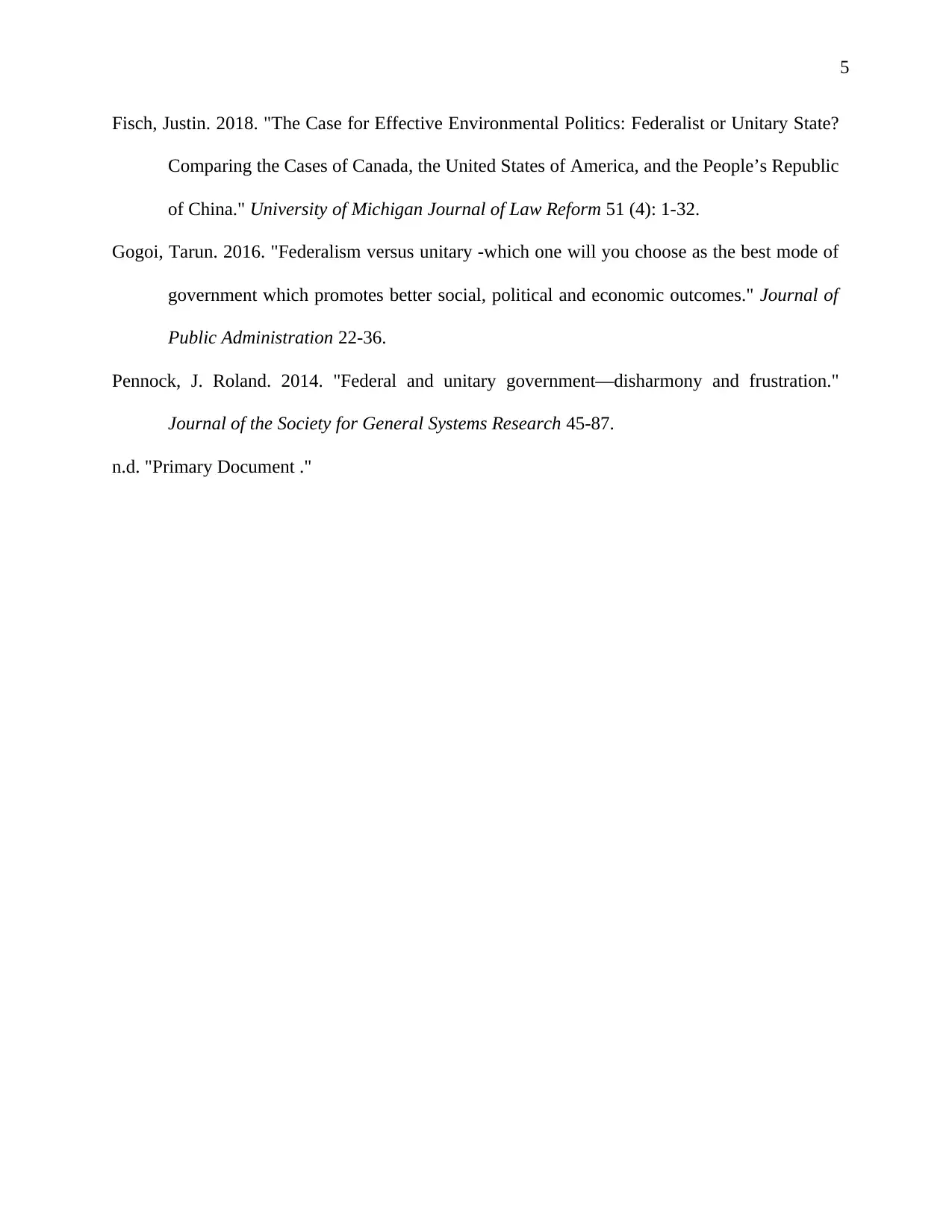Primary Document Analysis
VerifiedAdded on 2023/04/21
|5
|891
|356
AI Summary
This document provides an analysis of a primary document on the Confederation and John A. Macdonald's support of legislative government. It discusses the interests and concerns of the supporters and opponents of Confederation, the agreement reached, and the establishment of two houses. The document also explores the benefits and drawbacks of legislative government compared to federal government.
Contribute Materials
Your contribution can guide someone’s learning journey. Share your
documents today.

1
Primary Document Analysis
Name
Course
Date
Primary Document Analysis
Name
Course
Date
Secure Best Marks with AI Grader
Need help grading? Try our AI Grader for instant feedback on your assignments.

2
Part 1
Question 1
The Confederation was interested in convincing the Maritimers to join a larger union of
all the British North American colonies. The Confederation also as presented through John A.
Macdonald advocated for the legislative union with a stable central government, from which
legislation would flow to the provinces.1 However, there was a disagreement between the
supporters on Confederation on the most suitable constitution that Canada should adopt.
Question 2
The opponents of the Confederation who comprised of Maritimers and the French
Canadians shared the common interests and concerns, and this was witnessed when the two
groups vehemently opposed the legislative union and instead advocated for the federal union.
The anti-Confederation suggested for the union of equal partners including the colonies and
provinces to create a central organization that would handle the common affairs while the parties
control the local affairs. The dissenters of the Confederation position was against the legislative
union in that the equal partners’ suggestion would direct the affairs of the central government.
Despite the differences between the Confederation and other groups, they come into an
agreement at the end. It was agreed that the provinces were to be given a specific list of power
including language and education. The federal government, on the other hand, was to keep
residuals powers including all other unlisted powers essential for good governance. The
conference also agreed on the establishment of two houses: the lower house and the upper house.
The lower house was to look in the affairs of the populations while the upper house which
consisted of senators acted as regional representatives.
Part 2: Speech on John A. Macdonald’s Support of Legislative Government
1 n.d. "Primary Document ."
Part 1
Question 1
The Confederation was interested in convincing the Maritimers to join a larger union of
all the British North American colonies. The Confederation also as presented through John A.
Macdonald advocated for the legislative union with a stable central government, from which
legislation would flow to the provinces.1 However, there was a disagreement between the
supporters on Confederation on the most suitable constitution that Canada should adopt.
Question 2
The opponents of the Confederation who comprised of Maritimers and the French
Canadians shared the common interests and concerns, and this was witnessed when the two
groups vehemently opposed the legislative union and instead advocated for the federal union.
The anti-Confederation suggested for the union of equal partners including the colonies and
provinces to create a central organization that would handle the common affairs while the parties
control the local affairs. The dissenters of the Confederation position was against the legislative
union in that the equal partners’ suggestion would direct the affairs of the central government.
Despite the differences between the Confederation and other groups, they come into an
agreement at the end. It was agreed that the provinces were to be given a specific list of power
including language and education. The federal government, on the other hand, was to keep
residuals powers including all other unlisted powers essential for good governance. The
conference also agreed on the establishment of two houses: the lower house and the upper house.
The lower house was to look in the affairs of the populations while the upper house which
consisted of senators acted as regional representatives.
Part 2: Speech on John A. Macdonald’s Support of Legislative Government
1 n.d. "Primary Document ."

3
John A. Macdonald’s support of the legislative government sounds a noble idea, given
the benefits that come with this type of government. The legislative suggested by John A.
Macdonald’s would ensure that all the power rest with a centralized government. As such it will
be easy to move the government operations quickly and fast since there are few levels involved
unlike in the federal government.
The legislative government is also cheap to run since the delegation powers rest upon the
single or a few administrative units.2 The small size of the legislative government makes it cost
effective since it can be run in a single location.
Unlike the federal government, legislative governance promotes a sense of unity.3 This is
because there is no division of loyalties as it is the case with the federal government. The federal
government consists of different regions, and as a result, it ends up with the divided loyalties.
However, as much as the legislative government may have countless benefits, it is not the
right form of government, especially for the democratic society. With the federal government,
there are high chances that the leaders will develop into dictators and may end violating human
rights.4
The legislative government may also ignore the local issues since power, and
administrative units are centralized.5 As a result, the sub-states may stay underdeveloped.
2 Fisch, Justin. 2018. "The Case for Effective Environmental Politics: Federalist or Unitary State? Comparing the Cases
of Canada, the United States of America, and the People’s Republic of China." University of Michigan Journal of Law Reform 51
(4): 1-32.
3 Gogoi, Tarun. 2016. "Federalism versus unitary -which one will you choose as the best mode of governent which
promotes better social, political and economic outcomes." Journal of Public Administration 22-36.
4 Pennock, J. Roland. 2014. "Federal and unitary government—disharmony and frustration." Journal of the Society for
General Systems Research 45-87.
John A. Macdonald’s support of the legislative government sounds a noble idea, given
the benefits that come with this type of government. The legislative suggested by John A.
Macdonald’s would ensure that all the power rest with a centralized government. As such it will
be easy to move the government operations quickly and fast since there are few levels involved
unlike in the federal government.
The legislative government is also cheap to run since the delegation powers rest upon the
single or a few administrative units.2 The small size of the legislative government makes it cost
effective since it can be run in a single location.
Unlike the federal government, legislative governance promotes a sense of unity.3 This is
because there is no division of loyalties as it is the case with the federal government. The federal
government consists of different regions, and as a result, it ends up with the divided loyalties.
However, as much as the legislative government may have countless benefits, it is not the
right form of government, especially for the democratic society. With the federal government,
there are high chances that the leaders will develop into dictators and may end violating human
rights.4
The legislative government may also ignore the local issues since power, and
administrative units are centralized.5 As a result, the sub-states may stay underdeveloped.
2 Fisch, Justin. 2018. "The Case for Effective Environmental Politics: Federalist or Unitary State? Comparing the Cases
of Canada, the United States of America, and the People’s Republic of China." University of Michigan Journal of Law Reform 51
(4): 1-32.
3 Gogoi, Tarun. 2016. "Federalism versus unitary -which one will you choose as the best mode of governent which
promotes better social, political and economic outcomes." Journal of Public Administration 22-36.
4 Pennock, J. Roland. 2014. "Federal and unitary government—disharmony and frustration." Journal of the Society for
General Systems Research 45-87.

4
Therefore, the legislative government advocated by John A. Macdonald is not a wise idea, and
Canada should adopt the federal government.
Bibliography
5 Fisch, Justin. 2018. "The Case for Effective Environmental Politics: Federalist or Unitary State? Comparing the Cases
of Canada, the United States of America, and the People’s Republic of China." University of Michigan Journal of Law Reform 51
(4): 1-32.
Therefore, the legislative government advocated by John A. Macdonald is not a wise idea, and
Canada should adopt the federal government.
Bibliography
5 Fisch, Justin. 2018. "The Case for Effective Environmental Politics: Federalist or Unitary State? Comparing the Cases
of Canada, the United States of America, and the People’s Republic of China." University of Michigan Journal of Law Reform 51
(4): 1-32.
Secure Best Marks with AI Grader
Need help grading? Try our AI Grader for instant feedback on your assignments.

5
Fisch, Justin. 2018. "The Case for Effective Environmental Politics: Federalist or Unitary State?
Comparing the Cases of Canada, the United States of America, and the People’s Republic
of China." University of Michigan Journal of Law Reform 51 (4): 1-32.
Gogoi, Tarun. 2016. "Federalism versus unitary -which one will you choose as the best mode of
government which promotes better social, political and economic outcomes." Journal of
Public Administration 22-36.
Pennock, J. Roland. 2014. "Federal and unitary government—disharmony and frustration."
Journal of the Society for General Systems Research 45-87.
n.d. "Primary Document ."
Fisch, Justin. 2018. "The Case for Effective Environmental Politics: Federalist or Unitary State?
Comparing the Cases of Canada, the United States of America, and the People’s Republic
of China." University of Michigan Journal of Law Reform 51 (4): 1-32.
Gogoi, Tarun. 2016. "Federalism versus unitary -which one will you choose as the best mode of
government which promotes better social, political and economic outcomes." Journal of
Public Administration 22-36.
Pennock, J. Roland. 2014. "Federal and unitary government—disharmony and frustration."
Journal of the Society for General Systems Research 45-87.
n.d. "Primary Document ."
1 out of 5
Your All-in-One AI-Powered Toolkit for Academic Success.
+13062052269
info@desklib.com
Available 24*7 on WhatsApp / Email
![[object Object]](/_next/static/media/star-bottom.7253800d.svg)
Unlock your academic potential
© 2024 | Zucol Services PVT LTD | All rights reserved.